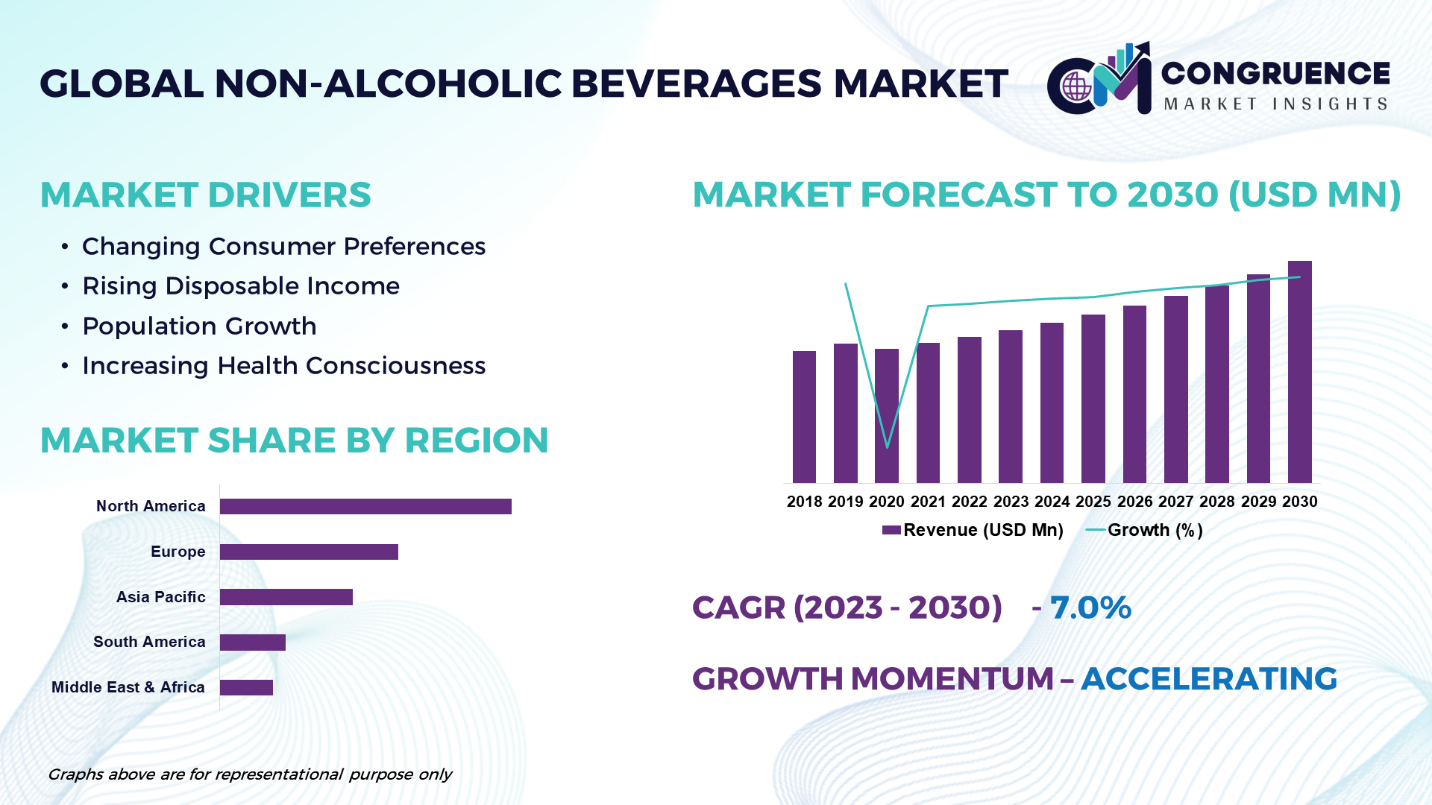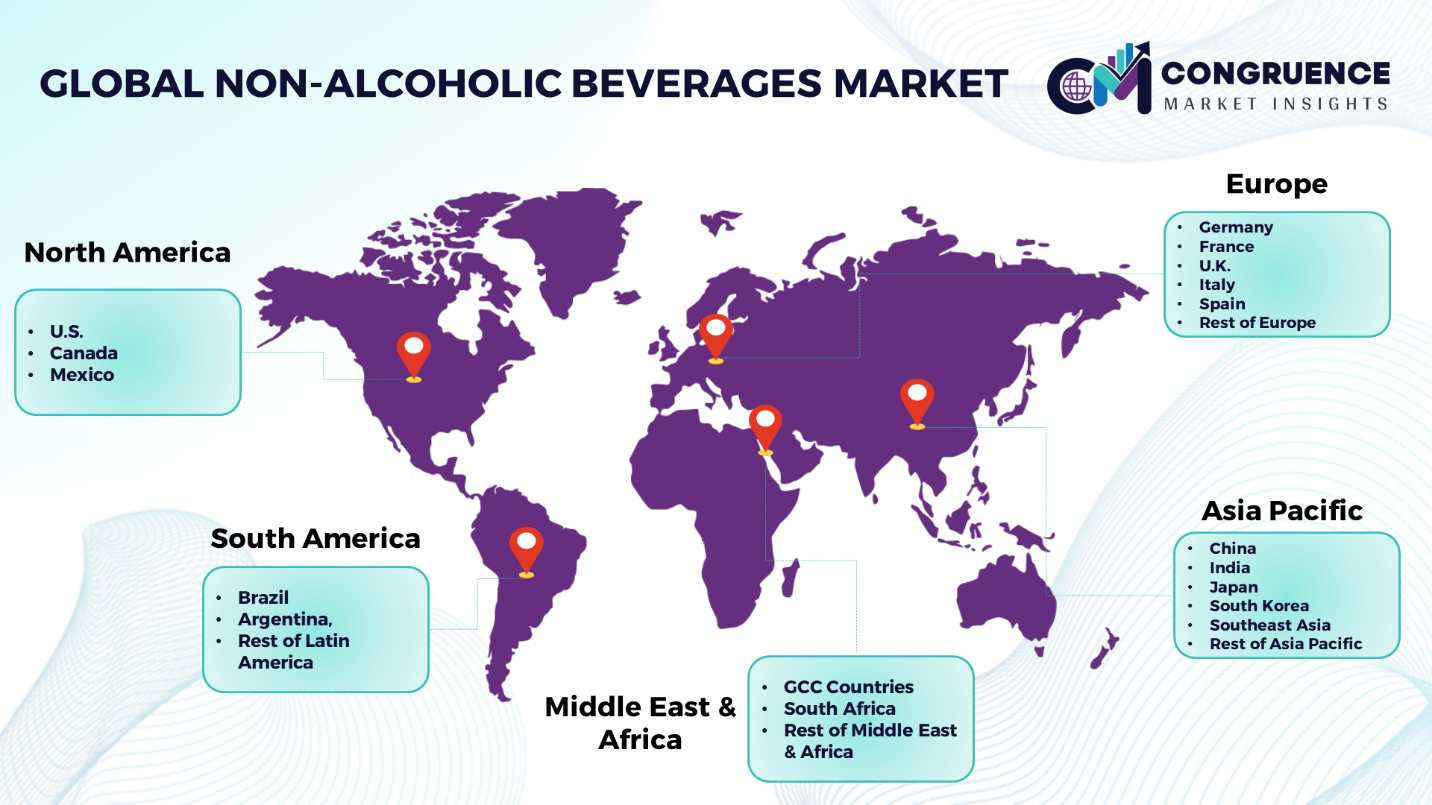Reports
The Global Non-alcoholic Beverages Market is expected to expand at a CAGR of 7.0% between 2023 and 2030. A non-alcoholic beverage is drink that do not contain alcohol or have very low alcohol content. They provide a flavorful and refreshing alternative to alcoholic drinks and are consumed by individuals who do not want to consume alcohol for several reasons including health concerns, personal preferences, and religious beliefs. The market for non-alcoholic beverages include soft drinks, juices, energy drinks, flavored water, mock tails, and herbal teas. Non-alcoholic beverages are becoming a popular choice of consumers due to health and wellness trends, social and cultural factors, and personal preferences. Depending on product type, the market can be classified into carbonated soft drinks, ready-to-drink tea and coffee, bottled water, fruit beverages, functional beverages, and others. Non-alcoholic beverages market caters to a wider range of flavors, tastes, preferences, and health considerations making them suitable for various occasions. The key factors behind the growth of the non-alcoholic beverages market are changing consumer preferences, rising disposable income, population growth, and increasing health consciousness.

Non-alcoholic Beverages Market Major Driving Forces
Changing Consumer Preferences: The global tea market is experiencing significant growth with the changing consumer preferences. The health conscious consumer show interest in beverages as healthier alternatives. Consumers are becoming more aware of health benefits which is driving the demand for tea beer.
Rising Disposable Income: The demand for non-alcoholic beverages is influenced by rising disposable incomes particularly in emerging countries. The growth in disposable income in developing nations has led to an increase in consumer spending on premium non-alcoholic beverages.
Population Growth: Population growth is another significant driver of the global non-alcoholic beverages market. The world’s population is growing rapidly which creates more demand for beverages. A larger population base creates a bigger consumer base for beverage companies.
Increasing Health Consciousness: One of the significant driver of the growth of the non-alcoholic beverages market is the increasing health consciousness among consumers. More people are becoming aware of the health impacts of excessive alcohol consumption, thereby seeking for healthier alternatives.
Non-alcoholic Beverages Market Key Opportunities
Evolution of E-Commerce Platforms: Consumers are becoming more reliant on the internet and e-commerce, technological developments, and virtual shopping trends are expected to impact the beverage industry significantly. Online sales channels allow for easier product accessibility and global market penetration.
Product Innovation: The continuous product innovation such as development of functional beverages, introducing a wide range of non-alcoholic beverages are expected to create significant opportunities for market growth. Companies can offer a wide range of non-alcoholic beverages including natural and organic options, functional drinks, and exotic flavors.
Market Expansion: Opportunities lie in expanding into emerging markets with increasing disposable incomes and urbanization. These regions provide opportunities for non-alcoholic beverage companies to tap into new customer base.
Non-alcoholic Beverages Market Key Trends
· The growing consumer preference towards healthy beverages enriched with nutrients is a significant market trend
· Strong demand from fitness conscious consumers for sports and energy drinks to get instant energy is the major trend shaping the market
· Functional and immune-boosting drinks are becoming more popular due to trends in health and well-being
· Increasing health awareness and consciousness among consumers that is driving the demand for beverages that provide nutrition, antioxidants, and probiotics
· Sustainable packaging and shipping solutions to reduce the environmental impact of non-alcoholic beverages distribution
· Consumers are willing to pay more for premium and artisanal non-alcoholic beverages that offer unique flavors
· Alcohol-free and low-alcohol drinks have gain popularity that cater to those who want the flavor and enjoyment of alcohol-based drinks, but without alcohol

Market Competition Landscape
The global non-alcoholic beverages market is characterized by high degree of competition among a large number of manufacturers. Leading players are focusing on launching new beverages with innovative flavors to attract consumers and boost sales potential. Key players in the non-alcoholic beverages market engage in strategies aimed at gaining a competitive edge. These strategies include product innovation, design differentiation, and the incorporation of sustainable and eco-friendly materials to meet evolving consumer preferences. Established brands leverage their reputation for quality and reliability to maintain market share, while newer entrants focus on disruptive innovations and unique selling propositions.
Key players in the global non-alcoholic beverages market implement various organic and inorganic strategies to strengthen and improve their market positioning. Prominent players in the market include:
· PepsiCo, Inc.
· The Coca-Cola Company
· Danone S.A.
· Nestlé S.A.
· Red Bull GmbH
· Keurig Dr Pepper Inc.
· Parle Agro
· Monster Beverage Corp
· Fomento Economico Mexicano SAB de CV
· Reed's, Inc.
· Arca Continental SAB de CV
· Celsius Holdings Inc.
· The Kraft Heinz Company
· Unilever
|
Report Attribute/Metric |
Details |
|
Base Year |
2022 |
|
Forecast Period |
2023 – 2030 |
|
Historical Data |
2018 to 2022 |
|
Forecast Unit |
Value (US$ Mn) |
|
Key Report Deliverable |
Revenue Forecast, Growth Trends, Market Dynamics, Segmental Overview, Regional and Country-wise Analysis, Competition Landscape |
|
Segments Covered |
· By Product Type (Carbonated Soft Drinks, Ready-to-Drink Tea and Coffee, Bottled Water, Fruit Beverages, Functional Beverages, and Others) · By Packaging Type (Bottles, Cans, Tetra Packs, Cartons, and Others) · By Source (Fruits, Vegetables, Cereals, Tea, Chocolate/Cocoa, Nuts, and Others) · By Sales Channel (Supermarkets/Hypermarkets, Specialty Stores, Convenience Stores, Online Retailing, and Others) |
|
Geographies Covered |
North America: U.S., Canada and Mexico Europe: Germany, France, U.K., Italy, Spain, and Rest of Europe Asia Pacific: China, India, Japan, South Korea, Southeast Asia, and Rest of Asia Pacific South America: Brazil, Argentina, and Rest of Latin America Middle East & Africa: GCC Countries, South Africa, and Rest of Middle East & Africa |
|
Key Players Analyzed |
PepsiCo, Inc., The Coca-Cola Company,Danone S.A.,Nestlé S.A.,Red Bull GmbH,Keurig Dr Pepper Inc.,Parle Agro,Monster Beverage Corp,Fomento Economico Mexicano SAB de CV,Reed's, Inc.,Arca Continental SAB de CV, Celsius Holdings Inc.,The Kraft Heinz Company, and Unilever |
|
Customization & Pricing |
Available on Request (10% Customization is Free) |
